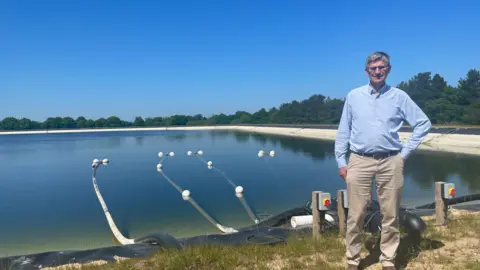Last week, Richard Thompson, chair of the National Drought Group, warned that water companies may need to bring in water restrictions to protect supplies if the dry weather continues.
At the moment the key questions are when will it next rain and when it does, how much will there be.
There are some signs that some rain is on the horizon, with unsettled weather from the west at the end of next week.
Drinking water comes from different places depending on the geography and geology of regions.
Roughly speaking, the south of England takes a long time to get into drought but a long time to leave. That’s because a lot of rainfall is stored in rocks underground and takes a long time to reach rivers and water supplies.
By contrast, the north of England quickly enters drought and quickly gets out because reservoirs are more heavily used for water supplies.
Water Companies introduce hosepipe bans when water supplies reach a certain low in their areas.
If drought conditions become severe, the government can restrict irrigation of farms, reduce boats’ movement on waterways, and limit water available to non-essential businesses like car washes.
In an extreme scenario, it could ration the amount of water available to homes and businesses but that has not happened since 1976.
Water industry bosses and the National Farmers’ Union (NFU) are calling on the government to do more to ensure the driest parts of the UK have secure water supplies in the face of any future drought.
Water UK, which represents the water industry, is calling for a new national water grid of pipes, canals and reservoirs to be set up in England to move water from the wettest regions to where it is most needed.
And farmers say they need more government funding and less planning red tape to build their own reservoirs to supply their farms.
 Malcolm Prior/BBC
Malcolm Prior/BBCMr Deane came together with five other farmers, including fruit growers, to build their own reservoir. It took four years and cost more than £1m.
It has proved vital, they say, with 15% of the stored water already used this year in the dry conditions.
But the group said obtaining planning permission was costly and difficult.
A government spokesman said it was working with the agricultural sector to improve its water supply resilience and establish more groups of farmers who could work together to develop their own reservoirs.
He added: “Over £104bn of private sector investment has been secured to fund essential infrastructure, including nine new reservoirs, to help secure our future water supply for farmers.”